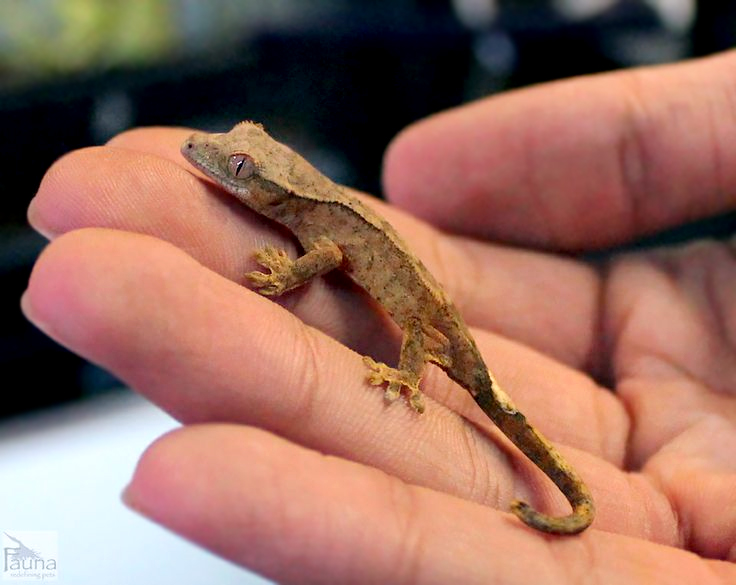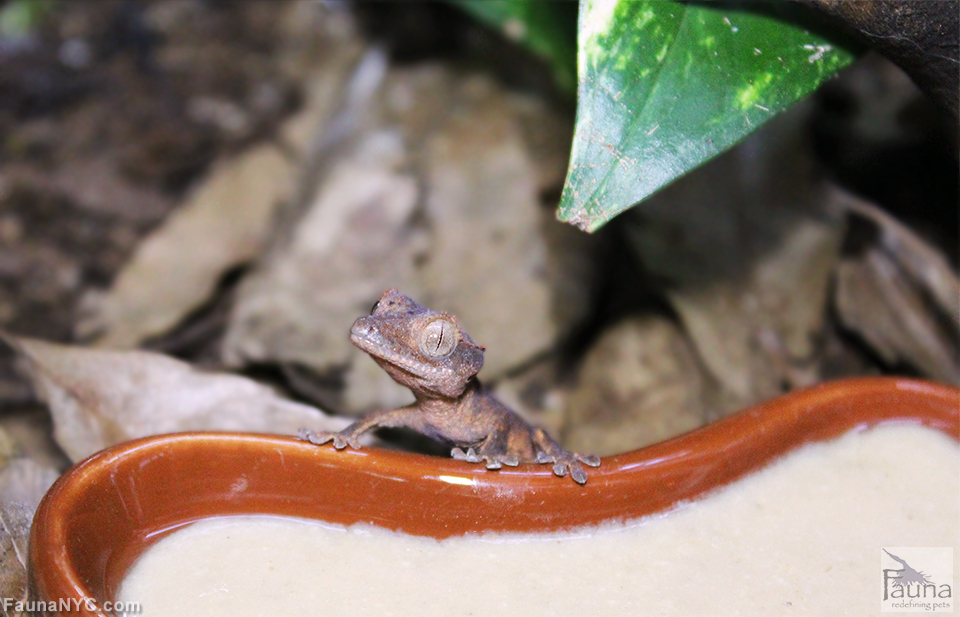Crested Gecko
(Correlophus ciliatus)

Crested Gecko
(Correlophus ciliatus)
This juvenile crested gecko (Correlophus ciliatus) was hatched here in the store. If he’s anything like the parents, he’ll be absolutely beautiful when he grows up.
All about the Crested Geckos
The crested gecko, native to New Caledonia, is a fascinating pet for the devoted herpetologist. Thought to be extinct until just a few decades ago, these geckos require a humid, vertical enclosure and a calcium rich diet of insects or crested gecko paste. They only grow to be about seven to nine inches in length, and come in several different color morphs.
The crested gecko has flat feet coated in hundreds of microscopic hairs which allow it to climb vertical surfaces. Though they are closely related to the gargoyle gecko, they are unable to regrow tails like other species. Crested geckos also lack eyelids, and lick their eyeballs instead. They are also sometimes called the “eyelash” gecko because of the tiny triangles above their eyes that give them an eyelash-like appearance.
What kind of home do they need?
Native to the trees of New Caledonia, northeast of Australia, the crested gecko needs a large, humid enclosure that is taller than it is wide. Crested geckos are arboreal, meaning they spend most of their life in trees. A vertical tank will allow the crested gecko to climb as he would in the wild. A 20 gallon tall is best at minimum, but you can always opt for larger to allow more movement.
The tank should have a good deal of surfaces for climbing, such as cork bark or driftwood, to enrich the gecko’s environment. It is also important that their enclosure is misted daily to mimic the rainfall of their native forests. This will ensure their skin stays moist and healthy. The humidity level of the tank should generally remain between 60%-80%.
Feeding a Crested Gecko
These geckos eat insects in the wild, but as a pet, they can most easily be fed a commercially available paste made of both insects and calcium. Baby foods can be added to the diet, but should not be used as the primary food item.
Handling and Temperament
Crested geckos, being arboreal, must leap from leaf to leaf in the wild, so they are excellent jumpers and will do so at the first given opportunity. Always make sure to watch the gecko closely while handling, because they can very easily hop right out of your hands. Let a crested gecko sit on your hand, which he will most likely cling to carefully.
Is a crested gecko right for me?
Crested geckos can be a bit tricky for the novice reptile owner, but with the right setup and dietary provisions, you can keep one happy and healthy for years. Before choosing a crested gecko, ensure that you will be able to provide the time needed to mist the tank daily, or the resources to invest in an automatic mister.
Crested geckos are probably not a good option for unattended children, as they can easily jump out of small hands and disappear.
Medical Questions
Calcium deficiency is a life threatening condition for reptiles that can be avoided with an adequate supply of calcium provided at all times. Geckos have a higher need for calcium than many other reptiles. Dehydration is also a possible ailment, so it is important to keep the terrarium at a high humidity level.
With any reptile, there is a risk of exposure to salmonella. It is important to always wash hands carefully after handling any animal, especially when children are involved. Never let a child put their pet anywhere near their mouth. It is common for reptiles to have a low number of internal parasites that do not normally pose any risk to humans. In times of stress, the reptile’s immune system may weaken and allow the parasites to overpopulate, posing a risk to the animal’s health.
As with any pet, it is of the utmost importance to seek veterinary care at the first sign of something wrong. We at Fauna recommend the Center for Avian and Exotic Medicine (see below for contact information). We are always happy to take your calls with any questions, and we will try to do our best to help you, but we are unable to provide all the necessary services a veterinarian can.
Fauna
265 West 87th Street (at Broadway)
New York, NY 10024
(212) 877-2473
faunanyc.com
faunacrew@gmail.com
The Center for Avian and Exotic Medicine
562 Columbus Avenue (at 88th Street)
New York, NY 10024
(212) 501-8750

